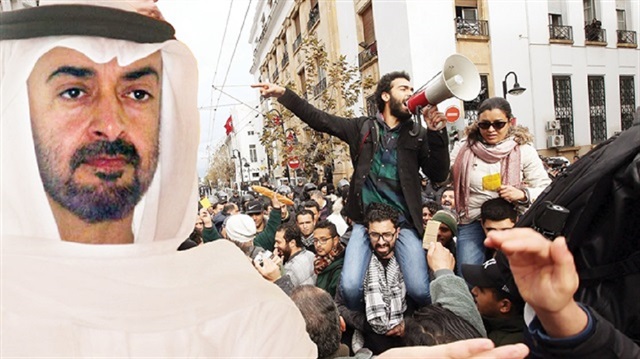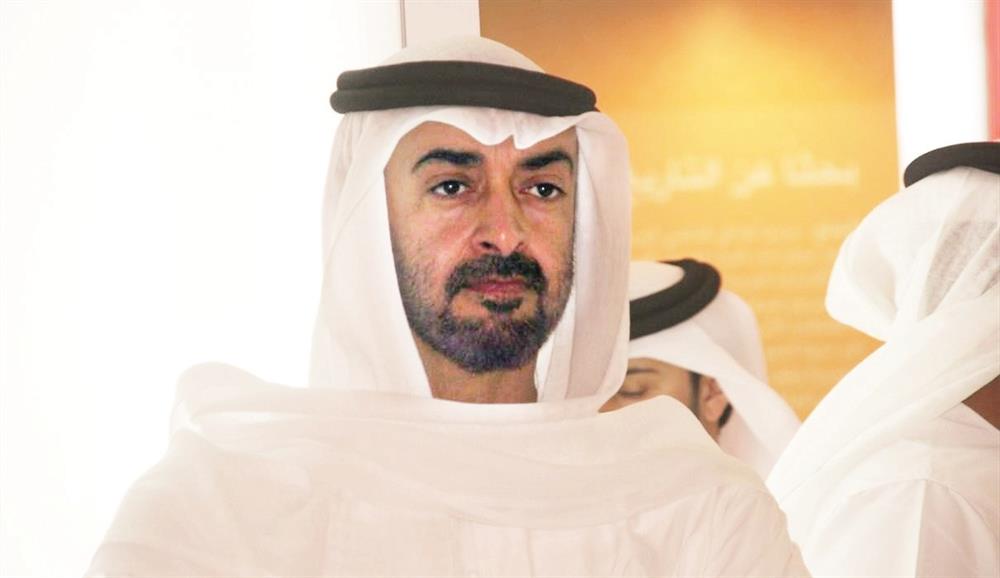
Over the past week, protests have erupted across Tunisia under the pretext of the “rising cost of living” amid reports of meddling by the Abu Dhabi administration in the most recent events
Reports emerged detailing UAE involvement in the most recent unrest in Tunisia as the North African country becomes the latest to be targeted by Emirati Crown Prince Mohammed bin Zayed al-Nahiyan, following past meddling in Syrian, Yemeni, Qatari affairs on behalf of the U.S.-Israel axis.
It is been said that last week’s drone attack on a Russian air base in Syria’s Khmeimim has UAE fingerprints all over it.
During President Erdoğan’s telephone conversation with his Russian counterpart on Friday, Putin noted that Russia “knows very well who’s behind the attack,” in reference to an attempt by the UAE to foil the Astana and Sochi agreements.
Tunisia, the only country to successfully complete a democratic transition after the Arab Spring, is another country that is being targeted by UAE meddling, according to reports by French newspapers Le Monde and Le Parisien.

The UAE administration, which is “uncomfortable” with Tunisia’s Ennahda party being part of the coalition government, is said to be applying pressure aimed at the assassination of several of its party members.
In a report published by the two French newspapers, it is said that the flight crisis instigated by the UAE administration was the first shot in what looks to become the first in a series of Emirati attempts at meddling in Tunisian affairs.
In December, the UAE announced that Emirates airlines would stop accepting Dubai-bound female passengers from Tunisia, which Tunisian officials responded to by suspending all Emirates flights to and from the country.
Over the past week, protests have erupted across Tunisia under the pretext of the “rising cost of living” amid reports of meddling by the Abu Dhabi administration in the most recent events, as the small Gulf nation has grown uncomfortable with Tunisia’s close ties with Ankara and Doha.
UAE is the one of the countries whose help was elicited by the U.S.-Israel axis to revive their failing strategy in Syria following the Astana accord between Turkey, Iran and Russia.
In a bid to foil the Sochi and Astana processes, the UAE is believed to be behind the most recent attack in Hama after several armed personnel carriers that belong to an Emirati company were spotted in the restive region.
Russia and Turkey, along with Iran are sponsoring the Astana peace talks, which focuses on a cease-fire and ending the six-and-a-half-year civil war in Syria.
Last June, the UAE also incited a row with Qatar when several Gulf countries, including Saudi Arabia, Bahrain, along with Egypt severed all diplomatic ties with the small Gulf monarchy, leading to a full-fledged crisis, after blockade countries closed their air, land and sea traffic to Qatar.
However, the plan to isolate Qatar failed when Turkey stepped in, launching a campaign to send aid to the Qataris.
The UAE was also behind the failed July 15 coup attempt in Turkey after the Gulf country was revealed to have given the FETÖ terror organization $3 billion in aid.
A high-ranking FETÖ delegation visited the UAE 22 times prior to the coup attempt.
Immediately following the coup attempt, FETÖ ringleader Fetullah Gülen, who enjoys a close friendship with Mohammad Dahlan and receives financial support from the UAE made a statement through the Emirati-based Al-Ghad channel.
In the statement, Gülen openly called for the need for UAE to intervene in Turkey, proving the ties that exist between FETÖ and Dahlan.
FETÖ terrorists are led by U.S.-based Fetullah Gülen, who orchestrated Turkey's July 15 coup attempt and is the mastermind behind a long-running campaign to overthrow the state through the infiltration of Turkish institutions, particularly the military, police and judiciary.
Details also emerged pointing to the UAE being behind the U.S. trial of goldtrader Reza Zarrab, after an Emirati-based company called Al-Nafees Exchange was revealed to have provided the U.S. with information and documents of its dealings with Zarrab.






